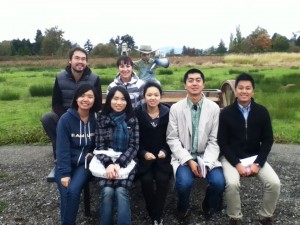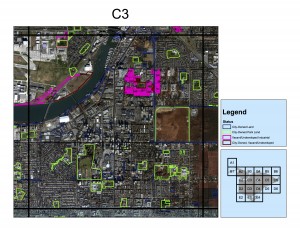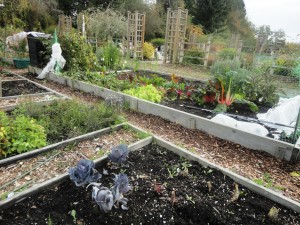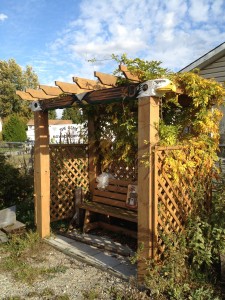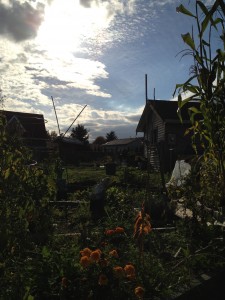“Out of sight, out of mind.” We sometimes get carried away with our own lives, trying to make ends meet, that we don’t stop to think of other people in our city that may be living hand-to-mouth. Through group 5’s effort to collect as much information as possible from individuals living in poverty in the Downtown Eastside Neighbourhood House, we are able to gain a greater perspective on their thoughts and reflections about the prices of living and food in Vancouver. The group was able to interview 17 individuals based on a standardized survey that they had created (scroll down for survey questions). In order to collect all this information, consent forms had to be given and the surveys were taken verbally and recorded for later transcription due to the language barrier.
Most of these individuals were older adults that are living on welfare. Some limitations that the group reported was the fact that it was a bias group of individuals that wanted to participate and although it was a plus having a multicultural group, it also provided language barriers. The group reported feeling that many individuals seemed interested in participating but may have not been confident in their English skills.
This project was overall worthwhile for group 5, they truly appreciated this opportunity that they received to learn and pilot this discussion that they feel needs to be had more often in our communities. They hope that this data collection could potentially spring on a policy change.
Being university students ourselves, this is a voice that we don’t generally get a chance to hear because we are so privileged to be given the opportunity to attend UBC. We, as LFS students, talk about food security and sovereignty on a daily bases but not very many of us know what it’s like to be living in such harsh situations. For this reason some individuals of group 5 decided to take on the $26 Welfare Challenge. Stick around to hear more about this challenge with a one-on-one interview with Etienne Nemanishen.
RIGHT TO FOOD SURVEY
- How many hours (on average) do you spend waiting in line every week?
- What would you be doing with your time if you weren’t standing in line?
- How many food lines do you stand in per week?
- What is one word that you would use to describe your experience in free-food line-ups?
- How many free meals do receive per week?
- Where do you obtain your free food?
- Are you satisfied with the free food that you receive?
- How many meals are you able to pay for per week?
- Where do you purchase your food?
- What sort of kitchen facilities do you currently have access to?
- What would you be able to cook if had improved facilities?
- What types of food make up the majority of your diet?
- Do you consider the nutritional values/origin of your food when making decisions regarding what to eat?
- Has your income changed your relationship to food in any way? If so, how?
- If welfare rates are increased, how would this affect the type and amount of food that you eat now?
- If welfare rates are increased, what would you be able to do that you are not able to do now?
- Is there anything further that you would like to say and/or comment on?
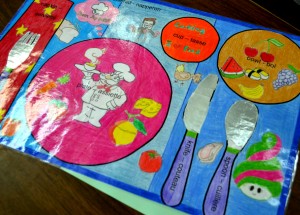 It’s time to get kids thinking about food in a new light, and what better way to encourage them to eat those greens than by having them cook it? Group 24 was invol
It’s time to get kids thinking about food in a new light, and what better way to encourage them to eat those greens than by having them cook it? Group 24 was invol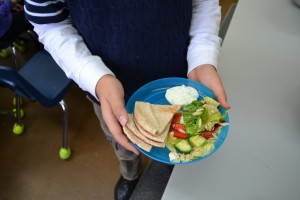 ved with a grade 5/6 split class at Queen Mary Elementary to show these young students the basics of healthful home cooking with lessons centered around eating with Canada’s Food Guide. Since they were cooking in a classroom, simple salads, kale chips, and muffins were the go-to recipes. And of course cooking with 30 children posed challenges for the team, particularly when they are overly excited and handling knives, but everything was handled well and the students even proved how capable they were with knife and food safety. Members of group 24 really enjoyed this project and were excited to see the keen interest of the class in cooking and learning about nutrients, while at the same time learning a great deal about classroom management. Group 24 hopes that their lessons will inspire the kids to start cooking at home and be more conscience of the foods they eat.
ved with a grade 5/6 split class at Queen Mary Elementary to show these young students the basics of healthful home cooking with lessons centered around eating with Canada’s Food Guide. Since they were cooking in a classroom, simple salads, kale chips, and muffins were the go-to recipes. And of course cooking with 30 children posed challenges for the team, particularly when they are overly excited and handling knives, but everything was handled well and the students even proved how capable they were with knife and food safety. Members of group 24 really enjoyed this project and were excited to see the keen interest of the class in cooking and learning about nutrients, while at the same time learning a great deal about classroom management. Group 24 hopes that their lessons will inspire the kids to start cooking at home and be more conscience of the foods they eat.